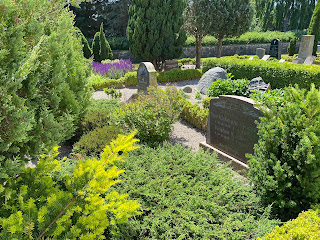The guesthouse where Cliff and I stayed in Tues Naes, had a washer-dryer, but the dryer wasn't working. We decided to drive to a laundromat, but then Cliff remembered a notice on the bulletin board of the boat dock where we had walked the day before.
We went there and asked the Jan, the dock manager. When we only needed a dryer, he told us just to go ahead and use it, and offered us coffee. No charge for either.
When the clothes were dry, I thanked Jan. He asked where we were from. We started talking about travel. He had been all over the world as a technician for Varian, a medical electronics company. He told us about going to Benghazi, Libya, and sitting at the airport shaking on the night he left, hoping he would get out alive.
Of all the places he had been in the world, the place he went the most in the final years of his career was the place he liked the least: Las Vegas. He is a tall, lean, strong man with a very calm affect, but he became animated talking about Las Vegas.
"They set up a training program in Vegas," he said. "Then they made it permanent. Every few months I would have to go there. I would spend a week or a month. I worked 10 or 12 hours a day. After work, I would get food from a local Italian restaurant and eat in my room."
He was not interested in clubs or shows or casinos. "We were building equipment to cure cancer," he said. "The company would hand cards to all the employees so they could eat steak and lobster in the casinos and get less healthy."
"Las Vegas takes water from everywhere," he said. "It's unnatural. It should not exist."
Then a little ferry swung up to the dock. It had seats for eight passengers and a small outboard motor. Jan said he had to do some work. We thanked him again and took the dry clothes back to the guesthouse.
Cliff and I were laughing on the way back about Jan's description of Las Vegas. Jan never actually said he liked Las Vegas more than Benghazi. It was clear he would never go to either again.

























